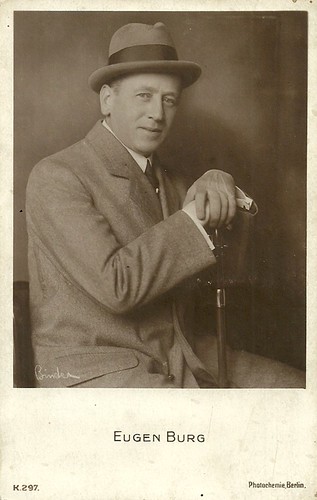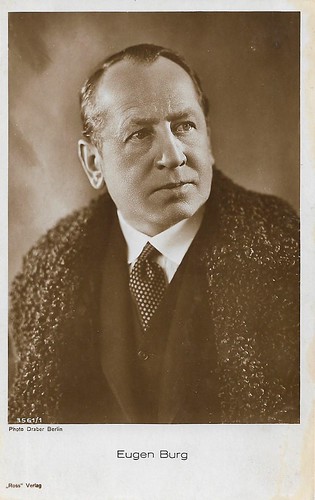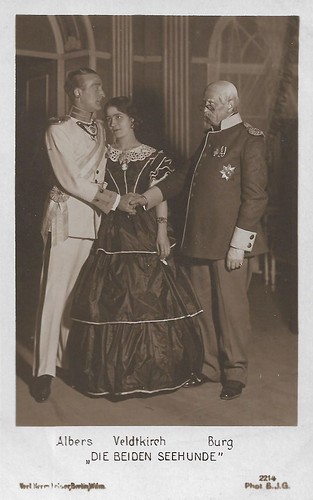
German postcard by Photochemie, Berlin, no. K.297. Photo: Alex Binder.

German postcard by Verlag Hermann Leiser, Berlin-Wilm., no. 5544. Caption: Eugen Burg in seinem Heim (Eugen Burg at home).

German postcard by Ross Verlag, no. 3561/1, 1928-1929. Photo Draber, Berlin.
A group of theatre-loving young people
Eugen Burg was born as Eugen Hirschburg in 1871 in Berlin. He was supposed to become a merchant, but he left his native Berlin in the 1890s to pursue a stage career in Vienna. There he received acting training from Maximilian Streben, then director of the Sulkowsky Private Theatre in the Viennese suburb of Matzleinsdorf.
Around the same time, Max Reinhardt also took acting lessons from Maximilian Streben. They began a lifelong friendship. Eugen Burg and Max Reinhardt belonged to a group of theatre-loving young people who called themselves the "Leopoldstadters", as most of them were residents of Vienna's Leopoldstadt. This group of theatre enthusiasts also included Luis Taufstein, with whom Eugen Burg wrote several plays.
Eugen Burg specialised in the role of the young lover and bon vivant. He made his stage debut in 1889 in the Bohemian spa town of Franzensbad in the comedy 'Die Wilddiebe' by Theodor Herzl, in the role of Max von Thürmer. In the years following his stage debut, Burg appeared on various imperial and royal provincial stages (Bielitz, Wiener Neustadt, Bad Ischl, Reichenberg, Troppau). In 1893 Eugen Burg was briefly engaged at the Jantsch Theatre in Vienna.
In the summer of 1894, he followed the call of director and theatre manager Otto Brahm to the Deutsches Theater in Berlin, where Eugen Burg appeared on stage with Joseph Kainz and Agnes Sorma until 1896. Another engagement in Vienna at the Raimund-Theater (1900-1904) was followed by a season at the Deutsches Schauspielhaus in Hamburg, which he left in 1905 to return to the Deutsches Theater, which by then was already directed by his friend Max Reinhardt. Between 1908 and 1909, Burg appeared at the Deutsches Theater in New York, where he also served as head director.
From 1910, Eugen Burg was then permanently based in Berlin and acted on several Berlin stages (Neues Schauspielhaus, Berliner Theater, Trianon-Theater, Residenz-Theater, Rotter-Bühnen, Deutsches Künstlertheater, Kleines Theater, Komische Oper). From 1935, after a last engagement at the theatre in Behrenstraße, he remained unemployed, classified by the Nazis as a 'full Jew'.

German postcard by Verlag Hermann Leiser, no. 2214. Photo: B.J.G. Hans Albers, Rose Veldtkirch, and Eugen Burg in the play 'Die beiden Seehunde' (The Two Seals), performed in 1918 at the Komödienhaus Berlin, and starring Albers as the Crown Prince. Albers was a close friend of Burg and later his son-in-law.

German postcard by Verlag Hermann Leiser, Berlin, no. 5444. Photo: Treumann-Larsen Film. Wanda Treumann in Im Schloß am See (Eugen Burg, 1918). Treumann's co-actors in this film were a.o. Eugen Burg, Carl Beckersachs and Reinhold Schünzel. It was approved by the German censor in May 1918.

German postcard by Photochemie, no. K. 2678. Photo: Treumann-Larsen Film. Wanda Treumann in the German silent comedy Elly und Nelly (Eugen Burg, 1918). The film passed German censorship in August 1918.
Banned from working by the Nazis
Eugen Burg was already 43 years old and a well-known stage actor when he appeared in front of the camera for the first time in 1914. At the Berlin PAGU studio, he was one of the earliest impersonators of Sherlock Holmes on screen, he played the famous detective in Das dunkle Schloß/The Dark Castle (Willy Zeyn, 1915) with Hanni Weisse and Friedrich Zelnik. Burg also appeared with Ferdinand Bonn as the two title characters in the farce Robert und Bertram/Robert and Bertram (Max Mack, 1915). Several more films by Mack followed.
From 1916, Burg started to direct too. He first made films with Ressel Orla, such as Gaugräfin Fifi/Gau countess Fifi (1916) and Gräfin Lukani/Countess Lukani (1917). From 1918 he directed a series of films with Wanda Treumann including Im Schloß am See/In the castle by the lake (1918), Elly und Nelly/Elly and Nelly (1918), Liebe, die sich frei verschenkt/Love that gives itself away freely (1919), Das Hexenlied/The Witches' Song (1919) Salome (1920), and Ninon de l'Enclos (1920).
In addition, he acted opposite Treumann in films directed by others such as Helga (N.N., 1918) and Die Prinzessin von Montecuculi/The Princess of Montecuculi (N.N., 1918). In 1920 he entirely focused on film acting and stopped directing. Burg became an important character actor in Weimar cinema, in films by a.o. Manfred Noa, Harry Piel, Carl Wilhelm, Friedrich Zelnik and opposite such stars as Hans Albers, Marcella Albani, Lya Mara, and Piel.
After some 70 films silent films as an actor, his first sound film was followed by the crime film Der Greifer/The Snatcher (Richard Eichberg, 1930). Alongside his pupil and protégé Hans Albers, Burg appeared here in the role of a chief inspector at Scotland Yard. He would also act opposite Albers in Der Sieger/The Winner (Hans Hinrich, Paul Martin, 1932), Der Draufgänger/The Daredevil (Richard Eichberg, 1931), and Der weiße Dämon/Dope (Kurt Gerron, 1932).
After the National Socialists came to power in 1933, Burg lost his engagement at Ufa because of his Jewishness and was expelled by the Reichsfachschaft Film from the Reichstheaterkammer and the Reichsfilmkammer and thus banned from working, which abruptly ended his career. Burg fled to Holland and was arrested there after the German invasion.
Eugen Burg was married to the coloratura singer and stage singer Emmy Burg-Raabe, who later worked as a concert singer and finally as a singing teacher. He was the father of the actress Hansi Burg, who had been Hans Albers' partner since 1925, and who had sometimes acted in Burg's own films. Burg was deported from Berlin to the Theresienstadt concentration camp together with his second wife on 28 January 1943. He was seriously ill and almost blind and died at the age of 73 in the home of the blind in the Theresienstadt concentration camp.
As mentioned, Burg's daughter Hansi became known for her long-term relationship with Albers whom she met while they were acting together. The Nazi Propaganda Minister Joseph Goebbels forced them in 1935 to split up because she was Jewish, although they remained in secret contact. Hansi did a fake marriage with a Norwegian architect and art dealer, but de facto she lived with Albers in Bavaria. In 1939 she fled via Switzerland to Britain and lived in exile in Great Britain during the war. She returned in 1945 and settled down to live with Albers again.

German postcard by Photochemie, no. K. 2900. Photo: Treumann-Larsen Film. Wanda Treumann in Das Hexenlied (Eugen Burg, 1919).

German postcard by Photochemie, no. K. 2901. Photo: Treumann-Larsen Film. Wanda Treumann in Das Hexenlied (Eugen Burg, 1919).
Sources: Wikipedia (German) and IMDb.
No comments:
Post a Comment